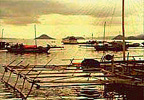










|
|
|||
|
Maluku lies across a transition zone between Asian and Australian fauna and flora, and also between the Malay-based cultures of western Indonesia and those of Melanesia. there are over 1,000 islands in the Province most of which are uninhabited. 85% of Maluku is water and it sits astride one of the world's most actively volatile volcanic belts. The region has known more than 70 eruptions over the last 400years. Tremors and volcanic explosions are by no means rare events and, in fact, many of the islands form classic scenes of volcanic cones rising out of the sea. Maluku is blessed with incredible sea gardens, idyllic,
tropical beaches and wonderful landscapes rich with a great variety
of endemic plant and animal species. The rugged, forest-coated
and mountainous hinterlands of the islands are home to the Racker
tailed king fisher, the Red-crested Moluccan cockatoo, and other
brilliantly-colored lorikeets and parrots. It was the Dutch, who arrived in 1599, that proved to be a strong adversary in the quest for, and control of, Maluku's tree surest Armed conflicts broke out, taking a heavy toll from the island populations as well as the rival European powers an' when the Dutch finally emerged as victors they enforced the trade monopoly with an iron fist. Whole villages were razed to the ground and thousands of islanders died, especially on the island of Banda, in the so called Hongi Expeditions. The British briefly occupied Maluku during the Napoleonic Wars, but Dutch rule was restored in 1814 and it wasn't until 1863 that the compulsory cultivation of spices was abolished in the province. Now it is fish and other sea products that are Maluku's major sources of revenue, but nickel, oil, manganese and various kinds of timber also contribute to the province's wealth. The main gateway into Maluku is through the provincial capital of Ambon, which is served by regular flights to most parts of the archipelago. Air and sea transportation connect the islands themselves together very well. The province has 79 seaports and 25 airports, but only about 4 km of roads. However, good roads on many of the islands provide easy access to the more remote places of interest. |
|||
|
 |
 |
 |
 |
 |
